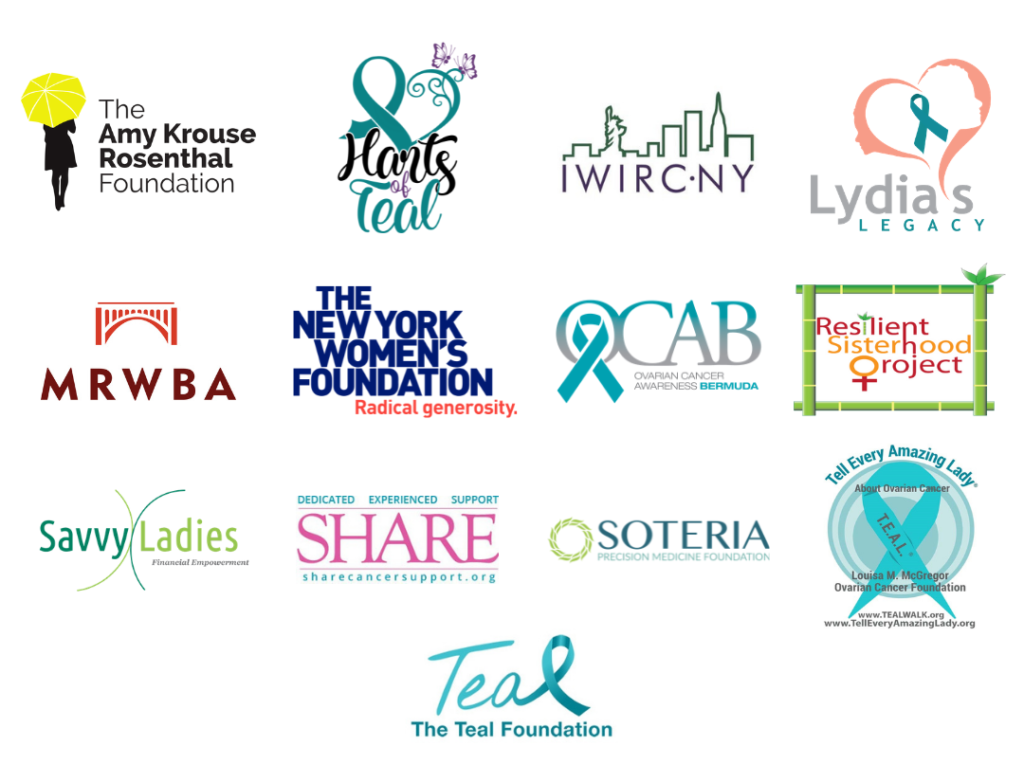EMPOWERU SERIES: THE ROLE GENETICS PLAYS IN GYNECOLOGIC CANCERS

The Tina’s Wish EmpowerU Series is available wherever you listen to podcasts, or at the link HERE.
The Tina’s Wish EmpowerU Series educates and empowers women in relation to their gynecologic health.
Knowledge is power! We welcome everyone to join us on this inclusive journey.
To watch with Spanish subtitles, CLICK HERE.
Tina’s Wish is currently seeking Community Partners and Sponsoring Partners. Community Partners participate in outreach and communication to their communities so that their constituents can benefit from the complimentary programming. Sponsoring Partners provide support to the Tina’s Wish mission.
Community Partners

Sponsoring Partners
Leadership Sponsors
For more information about the EmpowHER Series or Community and Sponsoring Partner opportunities, please download the brochure HERE or contact Beverly Wolfer, bwolfer@tinaswish.org.
To be added to our mailing list for EmpowerU Series updates,CLICK HERE.
To learn more about Tina‘s Wish research, CLICK HERE.
Q&A CHAT QUESTIONS THAT WENT UNANSWERED DURING WEBISODE #3
Please note that responses cannot address specific, personal issues. Replies are provided by a team of gynecologic oncologists and various medical websites. Please note that the information contained below is for education and awareness purposes only and does not constitute medical advice. Please be in consultation with your doctor (primary care physician or gynecologist) on any issues of concern to you, a family member or friend.
What do you recommend for someone that is adopted? Routine genetic testing?
Genetic testing of adopted children may be appropriate if there is a personal history that is concerning for a hereditary cancer risk. Some people who are adopted and do not have a personal history of cancer may also wish to consider genetic testing to assess for a possible hereditary cancer predisposition. Please note that any genetic testing should be coordinated by a genetics specialist, such as a certified genetic counselor, through a clinically approved genetic testing facility.
You may find the following article to be of interest, Click Here.
I had the BRCA 1 and BRCA 2 genetic test which was negative, yet I developed breast cancer; my sister has ovarian cancer; my brother had prostate cancer and my father had pancreatic cancer. I am concerned that I could develop ovarian or pancreatic cancer, what do you recommend?
First, sending best wishes to you and your family for full and complete recoveries.
We would suggest that you and all of your siblings work with a certified genetic counselor to review your prior genetic testing to determine if additional genetic testing through a clinically available laboratory is indicated, since there are other genes besides BRCA1/2 that can cause breast, ovarian, pancreatic, and prostate cancer. There have also been updates and improvements to BRCA1/2 genetic testing over the years, so testing the BRCA1/2 genes again may also be recommended.
Your genetic counselor and other healthcare providers should be aware of your complete medical and family health history to help guide them in making the most appropriate recommendations for additional genetic testing, as well as prevention and screening recommendations for you.
Can you explain a somatic mutation?
A somatic mutation is an alteration in DNA that occurs in a cell after conception. Somatic mutations can occur in any of the cells of the body except the germ cells (which are the sperm and egg cells). Therefore, somatic mutations cannot be passed on to children. These alterations can (but do not always) cause cancer or other diseases. Source: NCI
Somatic mutations that occur in cancer cells can sometimes be used to guide treatment decisions by an oncologist.
Somatic BRCA mutations occur in approximately 5%–7% of ovarian cancer cases.
How do we get molecular genetic testing covered by insurance? I have clear cell ovarian cancer and had then testing but insurance would not cover even though it would be helpful to understand to assist with recurrence.
Coverage of genetic testing to assess for a hereditary predisposition to cancer varies by insurance and is specific to each person’s plan. Therefore, we are unable to comment on specific policies and coverage.
There are options to pay out-of-pocket for genetic testing when insurance denies coverage of genetic testing. Please speak with your healthcare providers and/or genetic counselor to discuss your options in more detail.
Typically, genetic testing to assess for a hereditary risk for cancer does not assist in understanding if cancer will recur, but could determine if someone has an increased risk to develop a new cancer in the future.
Can you speak about PARP inhibitors (Lynparza) and how long one should stay on them?
Lynparza is a type of poly (ADP-ribose) polymerase, or ‘PARP’, inhibitor, and is a targeted therapy option for some people with an underlying (inherited) BRCA1/2 gene mutation who develop breast, ovarian, pancreatic, and prostate cancer.
PARP inhibitors work by interfering with the body’s process of repairing damaged DNA in cancer cells. Cancers that have an underlying BRCA1/2 gene mutation already have DNA-repair problems, and PARP inhibitors can make it even more difficult for these cancer cells to survive.
Please be in touch with your healthcare provider to discuss your specific situation and recommended duration of this drug. Tina’s Wish cannot provide specific treatment recommendations since each patient’s situation is unique and requires medical advice and consultation.




